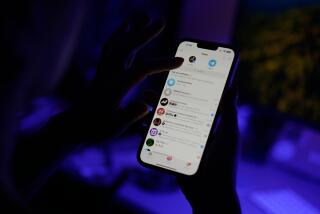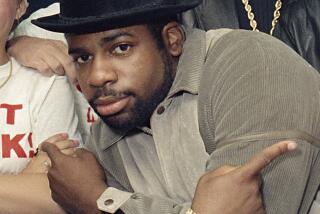McVeigh Ready to Die in Blast, Ex-Friend Says
- Share via
DENVER — Timothy J. McVeigh was so determined to kill as many people as possible in the federal building in Oklahoma City that he was prepared to die inside the exploding truck bomb, to shoot anyone who tried to stop him and to crash the truck through the front doors, a former close friend said Monday.
Michael Fortier, testifying in McVeigh’s federal capital murder trial here, described how he watched his ex-Army buddy stockpile explosive components and boast that he was targeting the Alfred P. Murrah Federal Building in Oklahoma City.
Fortier has become over the last two years the government’s most important witness in a case built largely on circumstantial evidence, its eyeglass for peering into the inner workings of the bomb conspiracy. Government prosecutors reached a plea agreement with Fortier, promised him a possible reduction in his sentence for his role in the conspiracy and dressed him up Monday in a new brown suit and maroon print tie.
With his hair combed, his beard shaved and his earring gone, Fortier methodically described McVeigh’s deep hatred of the government, his view that the government was responsible for the 1993 FBI raid on Branch Davidian cultists in which more than 80 died near Waco, Texas, and his resolve that--even if his friends deserted him--he would blow up the Murrah building.
At one point, his voice soft and slow, his posture erect, the 28-year-old Fortier described a December 1994 road trip he took with McVeigh to transport stolen firearms, including a short detour to case the Murrah building in downtown Oklahoma City.
Along the way, Fortier said, they passed a yellow Ryder truck on the interstate. “Tim motioned to it and said that’s the type of truck he was thinking of using,” Fortier said. “Except he wanted the one size larger.”
He said that McVeigh, now 29, talked openly of his plans, even as the two young men circled the Murrah building just four months before the April 19, 1995, explosion that killed 168 people and injured more than 500.
“He told me that he was thinking that he would have to stay inside the vehicle to make sure that it was going to go off . . . “ Fortier said. “He was going to sit inside the vehicle and, if anybody tried to stop it from blowing up, he was going to blow them away. He has a Glock .45 and he was talking about shooting them.”
Fortier added: “He made the comment to me that if he had to, he was going to drive the truck down the stairs and crash it through the front doors.”
The witness said McVeigh showed him the nine-story building, including an indented drop-off zone for deliveries where there were several steps in front of the building. Even Fortier was impressed at how easy it seemed to be to get a bomb so close to the building. “Yeah,” he said he told McVeigh. “You could probably fit three trucks in the front there.”
McVeigh also showed him a side street behind the Oklahoma City YMCA building--just a block and a half away, Fortier said. The YMCA structure would provide protection for his getaway car when the 2-ton ammonium nitrate and fuel oil bomb exploded. “He wanted to have a building between him and the blast,” Fortier said.
As he described intimate details of their friendship and, later, their parting, Fortier seldom looked at McVeigh. Rather, he stared ahead at chief prosecutor Joseph Hartzler, who led him through a series of questions--much as he had done earlier in the trial with Fortier’s wife, Lori.
Fortier maintained that he really never thought McVeigh would do it.
McVeigh’s emotions seemed to flicker. Sometimes he stared hard at his old friend. Other times he looked away, seeming somewhat disinterested.
“Well, if you don’t consider what happened in Oklahoma, Tim is a good person,” Fortier said. “He would stop and help somebody that’s broken down on the side of the road. I just didn’t think Tim had it in him.”
He also recalled that McVeigh had served as best man at his 1994 wedding. “Oh yes,” he said. “I don’t mean to belittle him in any way. I was very glad to have him as my best man.”
But later, when he saw the television pictures the morning of the bombing, he realized immediately what had happened. “I was shocked at all the destruction,” he said. “It was not what I was expecting to see on the TV. Right away I thought, ‘Tim did it.’ I thought, ‘Oh my God, he did it.’ ”
Fortier said McVeigh made clear his intentions: “He was wanting to blow up a building to cause a general uprising in America hopefully that would knock some people off the fence and urge them into taking action against the federal government.”
He said McVeigh wanted to detonate the bomb at 11 a.m. “because everybody would be getting ready for lunch.” He said McVeigh used an analogy from the movie, “Star Wars,” and characterized federal employees as “individually innocent. But because they are part of the evil empire, they were guilty by association.”
For Fortier, the hardest moment of his testimony came in telling the court about his own culpability in not reporting the conspiracy before it was carried out and for lying to the FBI, the press, his friends and his family.
He said that he even lied to his father. “My father was taking this very hard,” said Fortier. “He was going through a nervous breakdown about it. He asked me one night if I had any involvement with it or if I knew anything and I lied to him.”
Fortier struggled through the telling of that anecdote. He removed his glasses, buried his eyes in a handkerchief and cried.
To the grieving community of Oklahoma City and a nation shocked that such anger among former soldiers could turn to such destruction, Fortier said simply that he knows now he should have spoken up before the bombing.
“I live with that knowledge every day,” he said. “There is no excuse that I could offer that would compensate for why I didn’t.”
Fortier pleaded guilty to four felony charges the day--Aug. 10, 1995--that McVeigh and co-defendant Terry L. Nichols were indicted in the bombing. He pleaded to conspiracy to transport stolen firearms, transporting stolen firearms, lying to federal authorities and having prior knowledge of the bombing but not telling officials.
He was immediately incarcerated and could receive as much as 23 years in prison when he is sentenced after a separate trial for Nichols later this year. Because of his cooperation in both trials, however, it is expected that federal prosecutors will ask for a reduced sentence.
McVeigh and Nichols have pleaded not guilty in the bombing. If convicted, they could face death sentences.
McVeigh, Nichols and Fortier served in the Army together and later McVeigh began visiting Fortier at his home in Kingman, Ariz. It was during this time, Fortier said, that McVeigh’s anger about the FBI raid on the Waco compound seemed to propel him into carrying out the Oklahoma City bombing.
Under cross-examination by lead defense attorney Stephen Jones, Fortier acknowledged that the circumstances surrounding a gun robbery in Arkansas that the government says helped finance the bombing were somewhat ridiculous.
Fortier testified that McVeigh told him Nichols alone committed the crime in November 1994. McVeigh told him that Nichols dressed in camouflage clothing and a ski mask and robbed store owner Roger Moore at gunpoint, he said, and that Nichols tied up Moore with duct tape and began looting his house. But Nichols became tired, so he untied Moore and made him help.
“Well, that’s what Tim said,” Fortier said.
Fortier admitted that he shared many of McVeigh’s hard-right political views. He was against gun control, opposed to the Waco raid and feared that the United Nations was trying to take over the world.
He also admitted to heavy drug use, including smoking and snorting crystal methamphetamine and selling marijuana. And he said that after the bombing he schemed about making money by selling his story. He compared himself to Kato Kaelin, one of the witnesses in the O.J. Simpson double-murder case.
“I’m the key,” Fortier boasted on his telephone, while FBI agents listened in on a wiretap. “I’m the key man. The head honcho. Yep. I hold the key to it all. I could tell stories all day.”
He also bragged that, when it was his turn to testify in court, “I’ll sit up there and flick my nose at the camera.”
More to Read
Sign up for Essential California
The most important California stories and recommendations in your inbox every morning.
You may occasionally receive promotional content from the Los Angeles Times.










